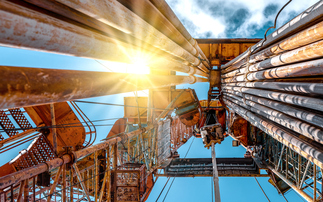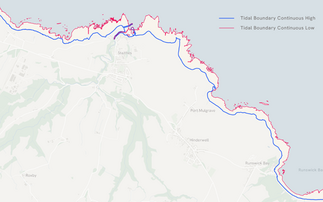
The global economy is currently defined by volatility, uncertainty, complexity, and ambiguity, but ahead of what is set to be a hugely eventful year there are some certainties green businesses can cling to
I am a big fan of all the articles and Twitter threads offering predictions for the year ahead. The format may have become so well worn as to become the stuff of cliché, an easy way of filling column inches during a quiet period in the news cycle before everyone gets properly back to work after the festive period. But done well it can offer valuable insights and a rare opportunity for reflections on the trends and events that will shape the coming months.
However, this year's selection feels somewhat off beam. In search of an authoritative voice, many commentators and analysts are either underplaying the huge level of uncertainty and volatility that will define the next 12 months or offering predictions so vague and platitudinous as to be of little real use. But the truth is that this year, arguably more than any other in recent times, will be defined by the huge number of 'known unknowns' faced by governments, businesses, and investors. It is, as the influential US pollster Nate Silver observed, going to be "a high-variance year".
To take just one climate-related issue, the COP29 Climate Summit will kick off in Baku, Azerbaijan on 11th November. It could plausibly take place just six days after President Biden has won re-election, with Russia on the way to defeat in Ukraine, and with a sustained ceasefire in Gaza and Israel having revived hopes of a two-state solution. It could equally plausibly, perhaps even more plausibly, take place in the face of the diametrically opposite scenario. The implications for climate diplomacy, the global net zero transition, and a lot more besides are enormous. No one can say with any real confidence which outcome will be borne out.
There are expected to be over 50 elections this year, with an estimated two billion people invited to vote. Even in those countries where weak democratic standards or commanding polling leads make the results something of a foregone conclusion, the potential for considerable political volatility and substantial policy changes is obvious.
The UK provides one such example. It would be wrong to suggest the result of the next election is guaranteed, especially given the level of political chaos of the past seven years, but Labour will be red hot favourites and hopes are high across the green business community that a new government would deliver a step change in decarbonisation efforts. Regardless of whether or not the fiscal outlook allows Labour to deliver on its goal of £28bn a year in green infrastructure investment, a change of government should unlock some increased spending as well as planning and regulatory reforms that would provide a significant boost to UK clean tech deployment.
But any such gains would come at the cost of the overt politicisation of the UK's climate goals, first through an election campaign where the government will repeatedly attack Labour's green spending plans and then through a Conservative Party leadership race where both favourites have previously called for the scrapping or weakening of the country's net zero target. It remains to be seen whether a Labour government would have the nerve to push through genuinely bold green economic reforms in face of inevitable political and media criticism. Equally, it is unclear how a more ambitious net zero strategy might fit into Rishi Sunak's plan to engineer a Lazarus-like recovery that can result in a shock victory later this year.
Meanwhile, the gap between Labour and Tory climate policies is, of course, nothing compared to the chasm between Joe Biden and Donald Trump's stance on the issue. Were Biden to win, the already transformative impact of the Inflation Reduction Act would be turbocharged and fledgling proposals for new green trade deals with the EU and others would likely advance. But if Biden loses and Trump returns to the White House - something polls suggest is entirely possible - the Republicans would look to swiftly remove the US from the Paris Agreement, launch an all-out assault on the Democrats' green infrastructure investment programmes, unleash an even bigger wave of new oil and gas licenses than that planned under Biden, and work with authoritarian allies to sabotage the UN climate talks. Trump's ability to curtail green investment would be limited by many State Governors' continuing commitment to climate action and the multi-billion dollar influence of corporate America, but the drag on the global net zero transition would still be considerable.
Worse still, the huge uncertainties faced by green businesses and investors are not limited to electoral politics.
Yesterday brought encouraging news the outlook for the UK economy has been upgraded by several influential analysts, with inflation now expected to fall back below two per cent in the next few months. It is a projection that will please business leaders even more than it will Number 10, but it came within hours of the killing of a Hamas leader in Beirut, a huge explosion in Iran, and yet more evidence shipping operators are avoiding the Red Sea for fear of further attacks from Iranian backed Houthi militias. Oil prices rose again this week. Alongside the humanitarian horrors, the impact of a regional conflict in the Gulf on global supply chains and inflation would be profound. It would also further exacerbate the disruption to shipping routes that has already resulted from the drought afflicting the Panama Canal.
Similar uncertainties are to be found in almost every geopolitical sphere. For example, China's economy is facing some of its biggest headwinds in decades and while the commitment to its clean energy transition appears unwavering it could be badly hampered by economic instability or, much worse still, conflict with Taiwan and the US. Again, no one can predict with any real confidence how these various conflicts and tensions will play out. But the UN yesterday warned it promises to be "another tough year" for the global economy, with growth well below the long term average recorded pre-pandemic.
More encouragingly, plans from the European Union, Australia, India, and other major emerging economies to accelerate net zero efforts should all advance. But they are all vulnerable to the economic damage and political distraction that would result from both worsening climate impacts and any metastasising of the conflicts that marred last year. The historians and analysts who talk of the conditions being right for a global Cold War turning hot are not necessarily scaremongering.
The problem for business, investors, and policymakers is how to plan and make informed decisions when the risks are so high and the spectrum of entirely feasible outcomes so broad?
The sad truth is there are no easy answers. We are living through a 'VUCA World' - a period defined by volatility, uncertainty, complexity, and ambiguity, much of which is driven by the environmental and climate breakdown that is the defining meta-story of the age. The best leaders recognise that fact and have stopped pretending simpler times are just around the corner. They are increasingly cognisant of the fragility of global systems and understand the urgent need for greater resilience. They are fully signed up to the 'Climate Theory of Everything'.
But beyond this shift in mindset, there are two steps businesses and investors can take to help minimise the risks and uncertainties they face this year.
The first is to shrink the target. There is a natural tendency for businesses to move into a defensive crouch when faced with economic challenges and rising costs - to cut outgoings, defer investment, and 'stick to their knitting'. But some defensive positions are better than others.
If the driver of many of the economic headwinds in recent years has been rising energy and material costs, then deferring investments that improve energy and resource efficiency or enable the switch to clean technologies is a false economy. Reduced energy use, smarter design, greener buildings, and shorter and more diverse supply chains all serve to reduce exposure to the worst-case scenarios that could all too easily play out this year.
The second step is to look beyond the myriad uncertainties and focus on the most established macrotrends.
Thankfully, many of these macrotrends are rooted in the green economy. Amidst all the drama and tragedy the world will inevitably experience over the next 12 months, it is highly likely we will experience a world-historic peak in global emissions. Renewables investment will continue to hit record levels, so too will electric vehicle sales. Heat pump, hydrogen, green building, and carbon capture markets will all continue to mature. The economics are too compelling and the risks of inaction too great for it to be any other way. As a result, fossil fuel demand will continue to be destroyed, further ratcheting up pressure on petrostates and oil majors to diversify or watch their influence wane.
There will inevitably be some backsliding, but in key US states, much of Europe, and the biggest Asian and emerging economy growth markets the policy environment will continue to improve for clean tech industries. The EU elections may see a surge in support for populist parties, but faced with the continued threat of Russia's weaponisation of energy supplies the bloc's support for rapid decarbonisation will remain solid.
Meanwhile, the run up to COP29 will be dominated by speculation about the US election, but it will be accompanied by a renewed push to deliver meaningful international climate finance reform. A consensus is building around how interest rates could be curbed for critical low carbon projects in industrialised and developing economies alike. The impact of the reforms proposed by Barbados Prime Minister Mia Mottley and increasingly championed by France's Emmanuel Macron could be transformational. A dramatic increase in flows of private sector led international climate finance feels inevitable, the only question is when it happens.
2024 will indeed be a high-variance year. The risks are immense and the uncertainties disorientating. The chances of a full-blown disaster are far too high for comfort. But the best way to minimise these risks and navigate these uncertainties is to recognise the fossil fuel age really is drawing to a close, and double down on the clean technologies and green business practices that offer the best hope of a prosperous new year for all.
A version of this article first appeared as part of BusinessGreen's Overnight Briefing email, which is available to all BusinessGreen Intelligence members.









